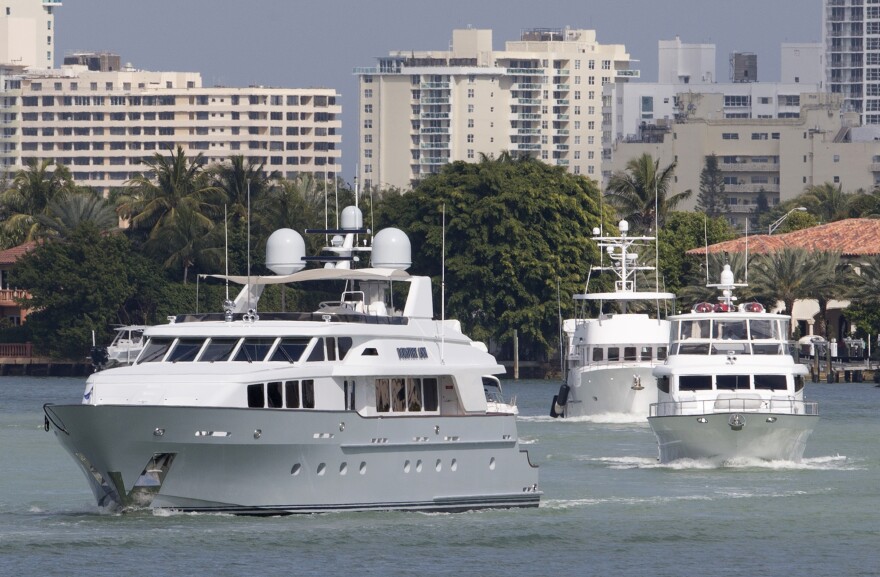Some members of South Florida’s sailing clubs have been shocked in recent months when local police have shown up, informing them that law enforcement will cut their mooring lines. In Palm Beach County, the issue came to a head on November 12, when members of the Palm Beach Town Council cast their final vote about the fate of anchoring and mooring on Lake Worth Lagoon.
At the November 12th meeting, the new mooring laws were upheld for Lake Worth Lagoon, an Intracoastal Waterway. Despite some boaters’ protestations, the law will still limit anchoring for no more than thirty days within a 6 month period to protect what authorities claim is a bid to restore the lagoons' health.
The law also limits which boats can moor within the town's waters and where they are allowed to moor. This can include marinas, mooring fields, and private residential docks.
The change in enforcement is based on HB 481, a law that came into effect in May that limits anchoring and mooring areas in counties with populations over 1.5 million. The legislation restricts boaters to anchor for only 30 days every six months. While some boaters say that HB 481 actively threatens the rights of responsible boaters, others support the change.
At the center of the debate are so-called “derelict” boats.
“There are areas [for example] Lake Worth, where the wanna be derelict boats are causing problems for the rest of us. They are causing legit mooring [and] anchoring options to be reduced and that probably will impact us when we sail up there,” says Paul Alcock of the Hillsboro Sailing Club.
Boat owners who live on their boats or who can’t afford the expensive slip fees to dock their boat at local marinas are bracing for impact. Now, according to HB 481, they will be violating the law simply by anchoring for too long in one place or if they are just sleeping through the night during a long trip.
Some say, too, that with so many people moving to Florida, marina slips are growing scarce, leaving owners with no choice but to moor their boats.
In the past, local governments had the authority to set anchoring restrictions, which created a jumble of differing, sometimes contradictory rules along Florida’s shoreline. However, a 2009 state law brought these inconsistencies to an end.
READ MORE: Supercharged hurricanes mean more ‘ghost boats’ haunting waterways
Now, in some parts of the state, HB 481 returns enforcement to local authorities’ hands, allowing local governments to vote on whether or not to follow the new restrictions. The law also closes parts of Biscayne Bay to overnight anchoring.
Proponents of the law say that moored boats are bad for the marine environment in general, and seagrass in particular, and lead to pollution in the waterways. But those who oppose HB 481 say that it limits boaters’ options.
"If I'm sailing my boat and the town of Palm Beach decides to cut the mooring ball, I will have no mooring to return to. I will be forced to anchor. After 30 days, I will be illegally anchored," Cary St. Onge of Manalapan, owner of an 80-foot-yacht, told The Palm Beach Post.
Multiple municipalities in Florida are already enforcing the law, including towns and cities in Hillsborough, Palm Beach, Broward, and Miami-Dade Counties. In line with these stricter rules, the town of Palm Beach has already cut mooring ties in Lake Worth Lagoon and along Peanut Island.
HB 481 also significantly impacts the way property owners will be able to anchor their own boats on their property. The Florida Boater Freedom Act restricts how much local governments can limit anchoring on their properties, but “no anchoring” areas still exist due to wildlife and environmental concerns.
While the implementation of HB 481 does not require boat lifts for all people living on the intercoastal with boats, some areas will need to install boat lifts on their property to ensure they are within the regulations of their areas.
“When it's low tide, my boat sits in about 2-3 feet of water,” said Lisa Cahir, a resident that lives on the intercoastal in Lighthouse Point. “I can see how it can be an environmental issue.”
Florida’s boating and marine industry brings in big bucks: The marine industry's annual economic impact is estimated at a whopping 31.3 billion dollars a year. Some say that HB 481 could impact this number. If Florida boaters are prohibited from mooring, some say, marinas, sailing clubs, and waterfront businesses could all be at risk of going under.
This story was produced by MediaLab@FAU, a project of Florida Atlantic University School of Communication and Multimedia Studies, as part of a content sharing partnership with the WLRN newsroom. The reporter can be reached here.





